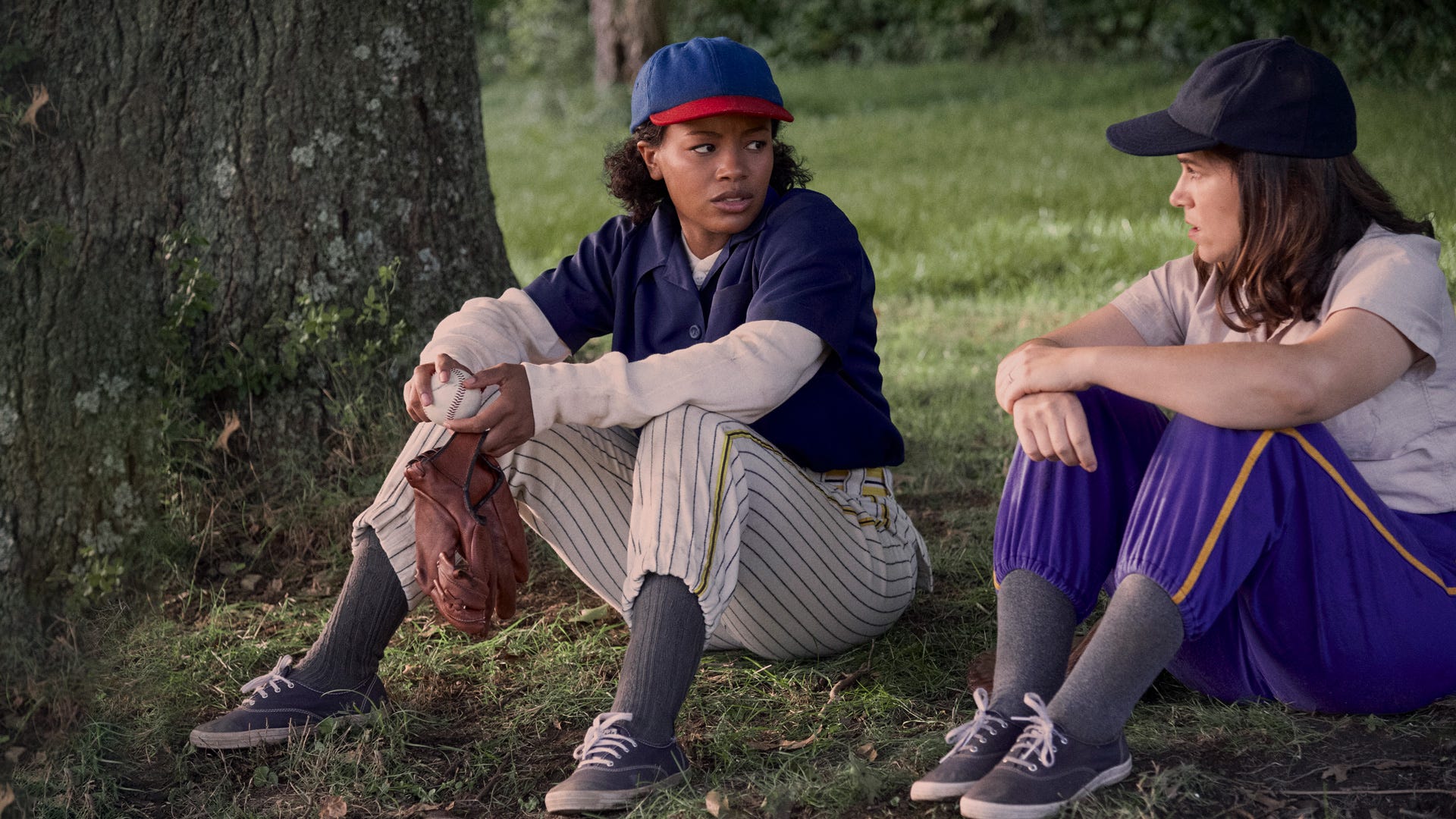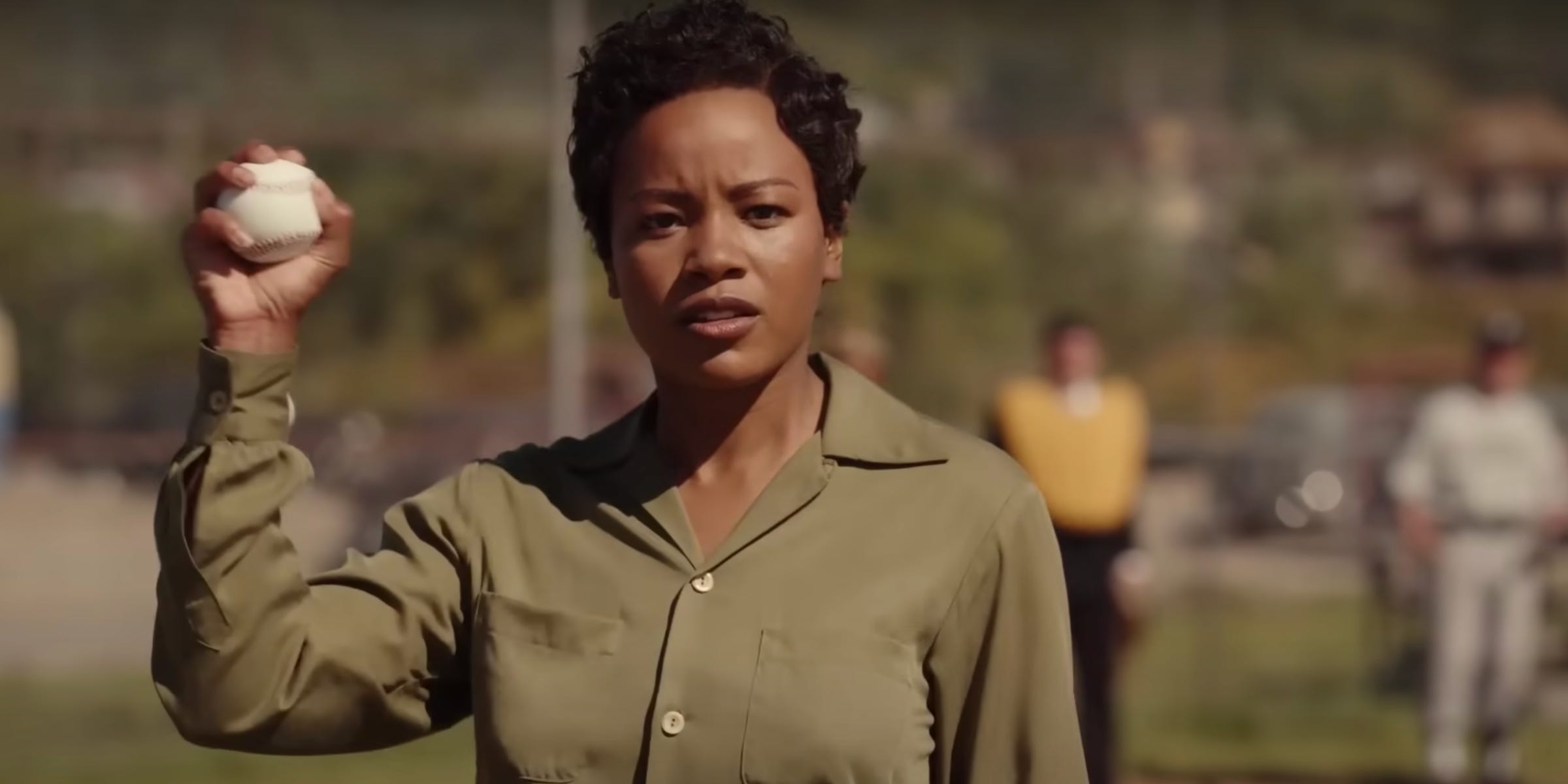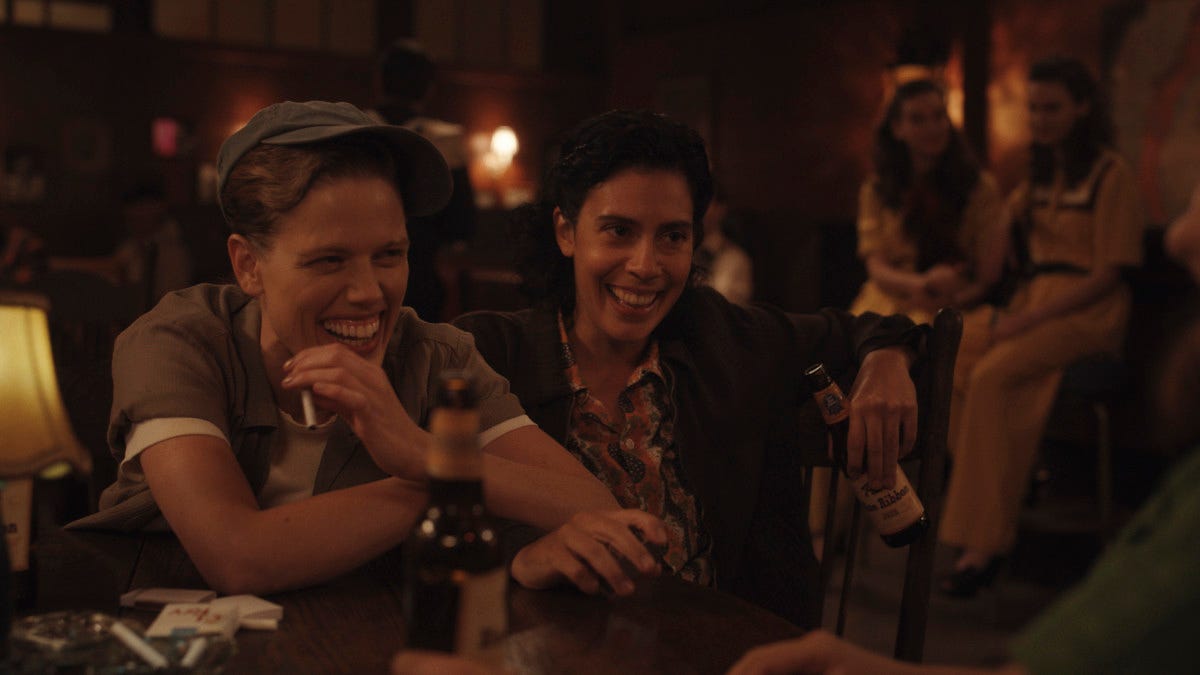Paging Dr. Lesbian - In Between Two Lesbian Worlds
Do you like lesbians? Do you like pop culture? Then you should subscribe to this newsletter. Even better, you should sign up for a paid subscription, which will get you more sweet sapphic content and allow me to keep writing stuff like this. Also, I’ve almost reached a subscriber milestone, so tell all your friends to subscribe too! - xoxo, Dr. Lesbian A League of Their Own is not a perfect show. There are times in the series when Abbi Jacobson’s character comes off as a slightly altered version of Broad City’s Abbi, an awkward millennial dressed in mid-century clothing and plopped down in the midwest. The dialogue isn’t faultless, either. Though anachronisms aren’t necessarily a faux-pas in a period piece, especially if placed intentionally, there are a few lines in the series that feel a little too similar to something someone might post on Instagram. But, in between a sprinkling of blunders, there are moments of brilliance. I’m thinking, for example, of a sequence that comes near the end of Episode 6. Carson (Jacobson), who has just recently discovered that lesbian bars exist, makes a bet with her paramour, Greta (D’arcy Carden), that they will go to the bar together if they win the next game. The Peaches win, of course, so Carson takes Greta to a bar run by a silver-haired butch named Vi (played by Rosie O’Donnell, in a nod to her role in the film). Carson and Greta dance together, and, for the first time ever, kiss in public (if you can call an underground lesbian bar the public) .Meanwhile, all the way across town, Max (Chanté Adams) is having a transformative experience of her own. Max has recently re-connected with her Uncle Bertie (Lea Robinson) – a character who would likely have identified as a trans man or a transmasculine person where he living today – and she has finally worked up the courage to attend one of Bertie’s house parties on the outskirts of town. Dressed in the pants and vest – but not the suit jacket – that Bertie selected for her, Max encounters a whole world of cross-dressing, same-gender-loving people that she never knew existed. Max spots a beautiful woman on the dance floor named Esther (Andia Winslow), and the two share a dance, and then a kiss The two sequences are intercut with one another, so Carson and Greta dancing is quickly followed by Max and Esther embracing, and vice versa. Shortly after Carson and Greta kiss, the bar they are at is raided by the police, putting a jarring end to the revelry. (Bertie’s party experiences no such interruptions – Max and the other partygoers wake up on the floor in the morning.) Though Carson and Greta’s joy is short-lived, it’s an incredible sequence that highlights the fact that happiness was actually possible for these women, even if it wasn’t always visible to the public. Had A League of Their Own been a true-to-life documentary series, it's very likely that Max and Carson would have never met. But, because this is a serialized television show, the two characters do come together at several points during the season. They first encounter one another during a sequence that mirrors a famous scene from the original movie. Max and her best friend, Clance (Gbemisola Ikumelo), attend tryouts and are turned away, but not before Max makes a throw that has Carson snapping to attention. They meet once more when Max happens upon Carson and Greta kissing in the back room of a club, and from then on, they become uneasy allies, and, eventually, maybe even something like friends. There are one or two moments where Max and Carson’s affiliation feels slightly forced, but it’s nonetheless a necessary facet of the narrative that allows viewers – as well as the characters themselves – to better understand how distinct their experiences are. Luckily, Max’s storyline is one of the most compelling in the entire series, and the path she charts (and will hopefully continue to chart in future seasons) is as exciting as it is undefined. Max and Carson’s parallel storylines are more than just useful narrative structures. They also mirror and illuminate the way things would have been for women like Max and Carson during this time. Max’s transformative night at her Uncle Bertie’s house party and Carson’s similarly profound evening at the lesbian bar with Greta is the perfect example of this divergence, and their distinct experiences reflect the spacial and geographical elements of black and white lesbian cultures at the time. The history of lesbian bars in the United States is longer than one might expect. Scholar Maxine Wolf “traces Lesbian use of bar environments in the U.S. to the late 1800s and the existence of bars used exclusively by Lesbians to the 1920s.” Following this period, lesbian bars emerged in numerous cities across the country, but inclusivity was not the name of the game. Though they may not have been referred to as such, most of these lesbian bars were, in effect, white lesbian bars. In their study of Buffalo in the 1930s and 40s, Elizabeth Lapovsky Kennedy and Madeline D. Davis found that black lesbians would have been greatly outnumbered at lesbian bars, meaning they would lack anonymity in these spaces. Instead, black lesbians most often socialized at house parties or at straight black bars (the latter of which would have forced them to remain closeted). In some cases, this de-facto segregation was more literally enforced. Numerous (white) lesbian bars had race-based quotas at the door wherein they would only let in a few black women in a given period of time. For example, archivists have found this to be true for Bonnie & Clyde’s in New York City. This type of discrimination occurred even through the 1980s, as a 1985 issue of Gay Community News reported a quota system being in use at a bar called Shescape around this time. These issues still occur within the LGBTQ community today, as black queer residents in cities like Atlanta have noted that their community is extremely segregated by race. Class was also a huge part of this implicit segregation. (White) lesbian bars generally catered to working-class women who were more accustomed to violence than their middle-class and upper-class counterparts. (We see just how dangerous these spaces could be at the jarring end of the aforementioned bar scene.) Working-class women (such as those who worked in factories) might experience violence if outed, but they could potentially keep their jobs. On the other hand, middle-class women (such as teachers) would almost certainly be fired if it was discovered they frequented these establishments. Class isn’t explicitly touched on in the series, but it certainly informs some of the dynamics at the lesbian bar, such as Lupe (Roberta Colindrez) and Jess’s (Kelly McCormack) familiarity with the space and Carson’s initial discomfort. These historical elements were clearly well-researched, and the inclusion of these little-known details is one of the very best aspects of the series. It may not be perfectly executed in every instance, but the writers’ commitment to exploring these parallel histories is admirable. Though Max is clearly able to find joy within the queer black enclave she has discovered, the form this group has taken is based on exclusion – from white spaces generally, from white lesbian spaces, and from straight black spaces. The nature of this exclusion (specifically from other lesbians) could certainly be made clearer and will hopefully be explored further if the series gets picked up for another season. But, at the same time, as Chanté Adams has noted, it’s wonderful to get to see queer black joy depicted in this way, especially considering how hard-won these chances at happiness were and how unfathomable they may seem to us now. Considering just how much the original movie left out, it’s exciting to see some of these omissions rectified, taking us down several paths that were never before ventured. The centrality of Max’s storyline within the overall narrative is refreshing, and, contrasted with Carson’s experience, the series becomes an edifying illustration of just how much of these histories remain unacknowledged and unexplored. When evaluated by these standards, A League of Their Own is a rousing achievement. You’re a free subscriber to Paging Dr. Lesbian. For the full experience, which includes weekly dispatches from the lesbian internet, become a paying subscriber. Your support means a lot! |
Older messages
'Delilah Green Doesn’t Care,' But Sapphic Readers Should
Sunday, August 28, 2022
On Ashely Herring Blake's addictive lesbian romance
Is Lesbian TV Dying?
Monday, August 22, 2022
Paging Dr. Lesbian's 'Where We Are On Lesbian TV' report
dispatch from there ARE lesbians in baseball
Wednesday, August 17, 2022
and something about the drama that never ends
"It’s like a bowl of soup on a cold day"
Sunday, August 14, 2022
In which I talk with a fanfic writer about why hurt/comfort is so damn comforting
A Lesbian Ghosting
Sunday, August 7, 2022
Queer Haunting and Grief in Hitchcock's 'Rebecca'
You Might Also Like
“In this Poem, We Will Not Glorify Sunrise” by Sarah Freligh
Monday, March 10, 2025
nor admire the apples that blossom / during a February heat wave ͏ ͏ ͏ ͏ ͏ ͏ ͏ ͏ ͏ ͏ ͏ ͏ ͏ ͏ ͏ ͏ ͏ ͏ ͏ ͏ ͏ ͏ ͏ ͏ ͏ ͏ ͏ ͏ ͏ ͏ ͏ ͏ ͏ ͏
Glen Powell to the (couture) rescue
Monday, March 10, 2025
— Check out what we Skimm'd for you today March 10, 2025 Subscribe Read in browser But first: our editors' cult-status products Update location or View forecast Good morning. While we might
Deporting Undocumented Workers Will Make Housing More Expensive
Monday, March 10, 2025
The effect will be most pronounced in Texas and California ͏ ͏ ͏ ͏ ͏ ͏ ͏ ͏ ͏ ͏ ͏ ͏ ͏ ͏ ͏ ͏ ͏ ͏ ͏ ͏ ͏ ͏ ͏ ͏ ͏ ͏ ͏ ͏ ͏ ͏ ͏ ͏ ͏ ͏ ͏ ͏ ͏ ͏ ͏ ͏ ͏ ͏ ͏ ͏ ͏ ͏ ͏ ͏ ͏ ͏ ͏ ͏ ͏ ͏ ͏ ͏ ͏ ͏ ͏ ͏ ͏ ͏ ͏ ͏ ͏ ͏ ͏ ͏ ͏ ͏ ͏
The Viral "Jellyfish" Haircut Is 2025's Most Controversial Trend
Monday, March 10, 2025
So edgy. The Zoe Report Daily The Zoe Report 3.9.2025 The Viral "Jellyfish" Haircut Is 2025's Most Controversial Trend (Hair) The Viral "Jellyfish" Haircut Is 2025's Most
Reacher. Is. Back. And Alan Ritchson's Star is STILL Rising
Sunday, March 9, 2025
View in Browser Men's Health SHOP MVP EXCLUSIVES SUBSCRIBE THIS WEEK'S MUST-READ Reacher. Is. Back. and Alan Ritchson's Star is STILL Rising. Reacher. Is. Back. and Alan Ritchson's Star
12 Charming Movies to Watch This Spring
Sunday, March 9, 2025
The sun is shining, the tank is clean – it's time to watch some movies ͏ ͏ ͏ ͏ ͏ ͏ ͏ ͏ ͏ ͏ ͏ ͏ ͏ ͏ ͏ ͏ ͏ ͏ ͏ ͏ ͏ ͏ ͏ ͏ ͏ ͏ ͏ ͏ ͏ ͏ ͏ ͏ ͏ ͏ ͏ ͏ ͏ ͏ ͏ ͏ ͏ ͏ ͏ ͏ ͏ ͏ ͏ ͏ ͏ ͏ ͏ ͏ ͏ ͏ ͏ ͏ ͏ ͏ ͏ ͏ ͏ ͏ ͏
10 Ways to Quiet Annoying Household Noises
Sunday, March 9, 2025
Digg Is Coming Back (Sort Of). Sometimes the that's noise bothering you is coming from inside the house. Not displaying correctly? View this newsletter online. TODAY'S FEATURED STORY 10 Ways to
The Weekly Wrap # 203
Sunday, March 9, 2025
03.09.2025 ͏ ͏ ͏ ͏ ͏ ͏ ͏ ͏ ͏ ͏ ͏ ͏ ͏ ͏ ͏ ͏ ͏ ͏ ͏ ͏ ͏ ͏ ͏ ͏ ͏ ͏ ͏ ͏ ͏ ͏ ͏ ͏ ͏ ͏ ͏ ͏ ͏ ͏ ͏ ͏ ͏ ͏ ͏ ͏ ͏ ͏ ͏ ͏ ͏ ͏ ͏ ͏ ͏ ͏ ͏ ͏ ͏ ͏ ͏ ͏ ͏ ͏ ͏ ͏ ͏ ͏ ͏ ͏ ͏ ͏ ͏ ͏ ͏ ͏ ͏ ͏ ͏ ͏ ͏ ͏ ͏ ͏ ͏ ͏ ͏ ͏ ͏ ͏ ͏ ͏ ͏ ͏ ͏ ͏ ͏
Weekend: Introducing the Butt Mullet Dress 👀
Sunday, March 9, 2025
— Check out what we Skimm'd for you today March 9, 2025 Subscribe Read in browser Header Image But first: Join the waitlist for a new premium Skimm experience Update location or View forecast
Starting Thursday: Rediscover Inspiration Through Wordsworth
Sunday, March 9, 2025
Last chance to register for our next literary seminar starting March 13. March Literary Seminar: Timothy Donnelly on William Wordsworth Rediscover one of the most influential poets of all time with





